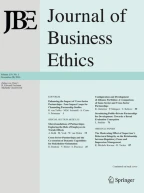Abstract
Following the research of Liedtka (1989), this paper examines the impact of her “values congruence” model on managers' work attitudes and perceptions of ethical practices within their firms. A nationwide cross-section of managers (N=1,059) provides the sample for the study. Consonance or clarity about both personal value systems and organizational value systems were found to be more important and, in the absence of one or the other, clarity of personal values were shown to have a more positive impact than organizational value clarity.
Similar content being viewed by others
References
Balazas, A. L.: 1990, ‘Value Congruency: The Case of the ‘Socially Responsible’ Firm’,Journal of Business Research 20, pp. 171–181.
Enz, C. and C. R. Schwenk: 1989, ‘Performance and Sharing of Organizational Values’, paper presented at the annual meeting of the Academy of Management, Washington, D.C.
Howard, R.: 1990 (Sept.–Oct.), ‘Values Make the Company: An Interview with Robert Haas’,Harvard Business Review 68, pp. 132–144.
Liedtka, J. M.: 1989, ‘Value Congruence: The Interplay of Individual and Organizational Value Systems’,Journal of Business Ethics 8, pp. 805–815.
Maddi, S. R. and S. C. Kobasa: 1984,The Hardy Executive: Health Under Stress (Dow-Jones/Irwin: Chicago).
Meglino, B., E. C. Ravlin and C. L. Adkins: 1989, ‘A Work Values Approach to Corporate Culture: A Field Test of the Value Congruence Process and its Relationship to Individual Outcomes’,Journal of Applied Psychology 74(3), pp. 424–432.
O'Reilly, C. A., J. Chatman and D. Caldwell: 1991, ‘People and Organizational Culture: A Q-sort Approach to Assessing Person-Organizational Fit’,Academy of Management Journal 34(3), pp. 487–516.
Posner, B. Z., J. M. Kouzes and W. H. Schmidt: 1985, ‘Shared Values Make a Difference: An Empirical Test of Corporate Culture’,Human Resource Management 24(3), pp. 293–310.
Vitell, S. J. and D. L. Davis: 1990, ‘Ethical Beliefs of MIS Professionals: The Frequency and Opportunity for Unethical Behavior’,Journal of Business Ethics 9, pp. 63–70.
Author information
Authors and Affiliations
Additional information
Barry Z. Posner is Professor of Management, Leavey School of Business and Administration, Santa Clara University, Santa Clara, California, and formerly Associate Dean for Academic Programs. His research interests include managerial values, effective intergroup dynamics, and leadership.
Warren H. Schmidt is Professor Emeritus of the University of Southern California. He is a Productivity Commissioner for the City of Los Angeles and President of Chrysalis, Inc., a management training and consulting organization. He is a Certified Psychologist in California and a Diplomate of the American Board of Professional Psychology. Dr. Schmidt's teaching, writing and consulting activities are designed to apply social science knowledge to the problems of managing and working in public and private organizations. Dr. Schmidt's writings include books, articles and films. Among his writings is aHarvard Business Review Classic on leadership co-authored with Robert Tannenbaum. He has screen credits for more than 70 management and educational motion pictures in which he has participated as writer, performer or advisor. One of the films written by Dr. Schmidt —“Is It Always Right to be Right?” — won an Academy Award in 1971 and was named “Best Training Film of the Decade” by the U.S. Industrial Film Board in 1980.
Rights and permissions
About this article
Cite this article
Posner, B.Z., Schmidt, W.H. Values congruence and differences between the interplay of personal and organizational value systems. J Bus Ethics 12, 341–347 (1993). https://doi.org/10.1007/BF00882023
Issue Date:
DOI: https://doi.org/10.1007/BF00882023
